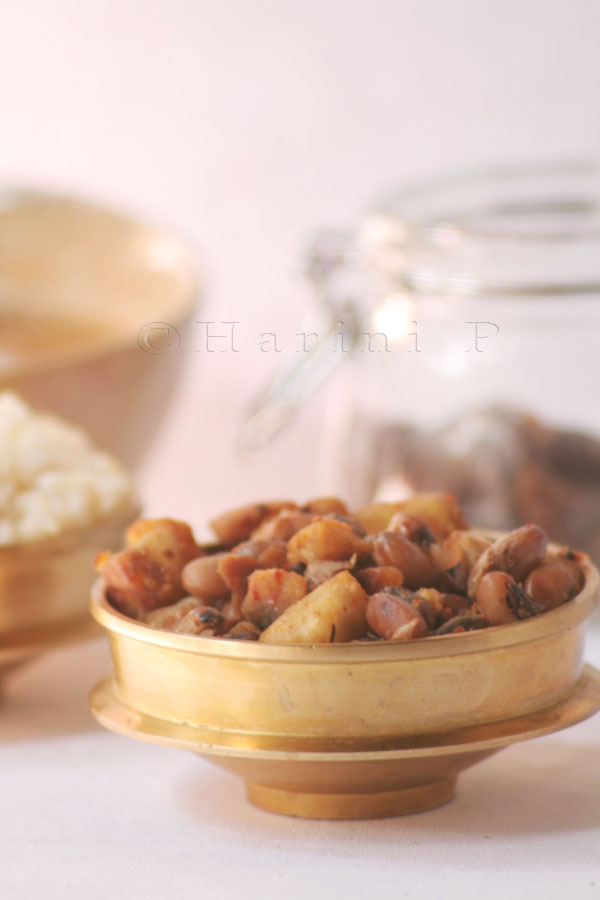Roasted Vegetables Palakkad Style / Mezhukkuvarati
It is 7:46p.m as I am starting to type this post. I got back home five minutes ago. Now that P is back for good and because he is able to get home quicker than I do, I got treated to hot tea as soon as I stepped into the kitchen. The sight of the cooker already on the gas and vegetables neatly chopped and steamed, just waiting for a final seasoning and garnish overwhelmed me beyond words. I smiled and clicked twice on the mozilla firefox icon, signed in to my mail and was pleasantly surprised by the first and only mail for the day. I know words can speak volumes but reading those three words stunned me! It was simple and yet forcible. A subscriber sent a mail with the masoor dal recipe extract and it just read - "I want more."
Normally, I don't like to blog at this time as there are many things that call for my attention apart from two eager enthusiastic children ready to fill me in with the happenings of the day. Today, I decided to go on to the dashboard and get going with this very simple 'Palakkad' recipe that is made regularly in most Keralite homes and never ceases to cause extreme cases of salivation! Thanks, SK for the motivation!
Mezhukku means 'fat' and varatti means 'to roast'. You could suffix it with puratti instead of varatti but the essence is the same. Vegetables roasted in fat, with or without karamani.
Karamani is known by many names and some of these are 'black eyed beans', 'lobia', 'chowli' or 'chowlai dana'. Black eyed beans are a very tasty variety of legumes which are seeds of amaranth plant (mulaikeerai or molakeerai in Tamil and hara maath in Marathi).
How to cook black eyed beans?
If you pressure cook the beans without pre-soaking they will not cook through completely. The first way is to either soak them in enough water for at least an hour before pressure cooking. The second alternative which is my preferred method is to dry roast the legumes on low fire till slightly brown specks appear, cook them in enough water for three whistles and let the pressure go down naturally. After cooking they will appear brown in colour. Do not add salt or turmeric while cooking legumes.
Dish: Mixed vegetable mezhukkuvaratti / Assorted vegetables
Yield: Never enough but this measure generally is enough to serve a five good eaters.
Ingredients:
2 raw bananas (firm, green ones) / kachha kela / vazhakkai - diced small (0.75cm on each side for the Monicas of the world)
100g elephant's foot yam / suran / chenai - diced small
2 medium sized potatoes / aloo / urulaikazhangu, firm ones - diced small
1 cup cooked black eyed beans / lobia / karamani /payaru
Coconut oil / Nariyal tel / Tengai yennai - 3-4 tbsp.
(The oil may seem lots now but when you see the amount of vegetable and legumes you will realize it is practical to use that much!)
Salt to taste
Method:
Boil and cook the vegetables together, in enough water and salt till almost done. You need them to retain their firmness and not turn soft. Drain and set aside till needed.
Heat 2 tbsp. oil in a wide kadai or wok. Add drained vegetables and mix well to coat them evenly. Now let it roast well in slow fire. It takes nearly 1/2 an hour as the fire should be slow and you need to stir it every now and then. It may seem time consuming but then you can plan this and do many other thngs in the mean time.
If you find that the vegetables are sticking to the kadai, scrape lightly and add a tbsp. of oil more and continue roasting in slow fire. Check salt and adjust as per taste. You may add red chilli powder at this stage if you need it but I do not.
When you find the vegetables crisp and roasted, add the drained, cooked black eyed beans and mix well so that some of it coats the vegetables and some remain firm. Mix well and roast. I purposely roast a lot without oil because I like the part that sticks to the bottom of the wok. We actually used to fight over that portion when we were kids!
Add a tsp. of oil, give a final stir and remove. Generally 3 tbsps. are quite enough but you may need more if the vegetables are done well enough.
The yield is nearly 6-7 cups so the amount of oil is justified, isn't it?
Serve with rasam, rice and sambar. Though I am now vegan, I can never forget how tasty this is with dahi-rice or thayir chaadam!
Roasted Vegetables Palakkad Style / Mezhukkuvarati
Our weekend was a long one as Holi fell on Monday, so my weekday started today! Happy week ahead, folks!
How to make sambar like a Palakkad Iyer!
How to make beans mezhukkuvaratti like Bindu's Mom!
Want to make rasam like I do?
Well, now all you have to do is eat curd rice like a typical Iyer would!!
Bon Appetit! Thank you once again, SK! It is 8:34 as I am finishing this post. The kitchen is calling and I am leaving with a silly, wide grin all over my face!Labels: Kerala, mezhukkuvaratti, mezhukupuratti, mixed vegetable roast, Palakkad Kyer cuisine, South Indian Vegan food, Sunshinemom, Tongue ticklers, vazhakkai mezhukkuvaratti
